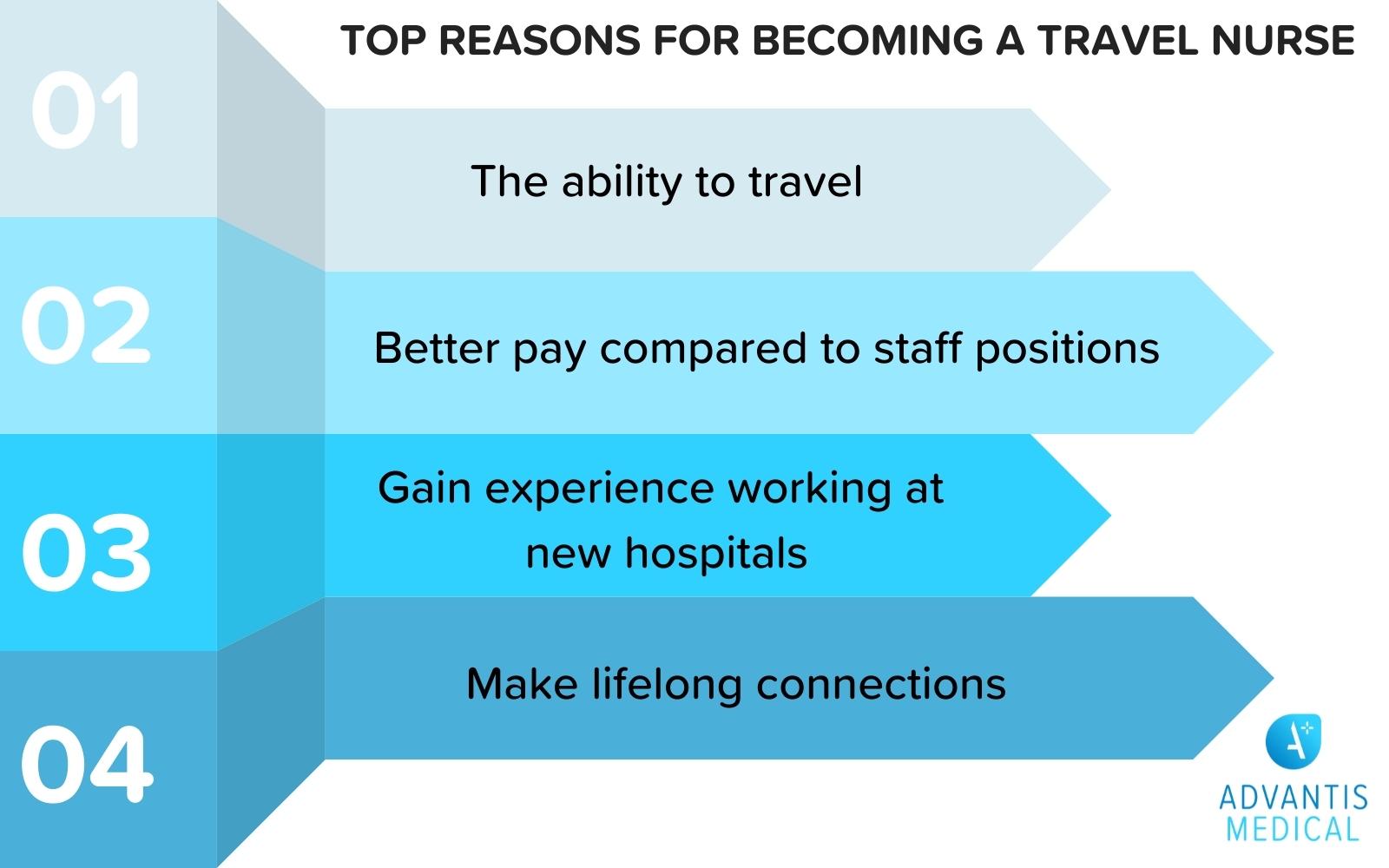Nursing has always been a cornerstone of essential service within the healthcare system, with the demand for skilled and adaptable nurses continuously growing. It’s no wonder many people want to learn how to become a travel nurse.
Travel nurses, in particular, have become increasingly vital, providing a dynamic solution to the ever-changing healthcare landscape. These professionals bridge staffing gaps, bring expertise to diverse settings, and ensure nationwide high-quality care.
In this guide, we’ll explore the journey of becoming a travel nurse, highlighting the requirements, benefits, and unique opportunities that this career path offers and how to become a travel nurse.
When it comes to choosing a career as a Travel Nurse, options seem intimidating. Advantis Medical cares, and wants you to have a positive recruitment experience.
What is a Traveling Nurse?
A registered nurse (RN) who accepts temporary assignments at various healthcare facilities and locations nationwide is known as a traveling nurse.
How to Become a Travel Nurse?
To fill in temporarily for absent permanent staff or a nursing shortage, typically for 8-26 weeks, traveling nurses often work in hospitals, clinics, nursing homes, and other healthcare institutions.
They must be able to operate in various settings and possess the same credentials as registered nurses. Understanding these credentials is a critical part of knowing how to become a travel nurse.
Traveling nurses are frequently required to fill in during periods of high demand, such as during a crisis or in seasonal regions. So why do so many nurses find out how to become a travel nurse?
Travel nurses make more money than regular nurses and may look forward to a fun, dynamic work atmosphere. They meet new people and have an opportunity to travel the country.
What Does a Travel Nurse Do?
Travel nurses provide patient care services such as medication administration, vital sign monitoring, medical treatment, and education and support to patients and their families. Also, they frequently collaborate with other medical experts to ensure the right treatment is provided.
They work with doctors, surgeons, and other nurses. In addition to appointment setting and patient transfers, travel nurses may also be in charge of general administrative support.
How to Become a Travel Nurse?
There are many different reasons why people may choose to become travel nurses. While it may not be the right choice for everyone, many people have found success and fulfillment by deciding how to become a travel nurse and making this exciting career change.
4 Reasons to Learn How to Become a Travel Nurse
1. Travel
One of the number one reasons why people learn how to become a Travel Nurse is to get to travel! A common regret that people have at the end of their lives is that they wished they had traveled more, and by becoming a Travel Nurse, you can be sure to fulfill the desire to visit cities all over the country with travel nursing assignments.
2. Better Pay
Becoming a Travel Nurse makes it possible to bring your “supply of expertise to a market with greater demand. Since the demand for certain types of nursing work is higher in some areas than others, it is possible to receive a higher salary for the same work by switching to a different city or travel contract!
3. Working at New Hospitals
While it may be comforting for some people to work at the same hospital for their whole career, others appreciate the experience of getting to work at different hospitals.
The average contract for a Travel Nurse is about 13 weeks, so depending on how long you want to work in a given area, it is possible to work at 3 or 4 different hospitals a year!
4. Meeting New People
If you are an outgoing person then what may be a selling point for you is getting to meet and work with new people. Finding out how to become a travel nurse can be a fulfilling change. Every new hospital you work at is full of opportunities to meet hundreds of new people, with hundreds of new perspectives to learn from.
Advantis Medical is committed to helping Allied Health Professionals find the best opportunities in interesting locations across the United States.

7 Benefits: Why Become a Travel Nurse
While it is hard to quantify the experience of traveling for a living, plenty of benefits come from becoming a Travel Nurse with Advantis Medical.
- Travel Nurses can expect to be paid weekly, with direct deposit available on day 1
- An industry-leading referral program with unlimited earning potential for referring qualified registered nurses and allied health professionals
- Medical, dental, and vision insurance packages
- Access to 401k
- Assistance with travel nurse housing
- Highly competitive pay packages
- The love, care, and attention that comes from being on the Advantis Medical team!
The world is yours to explore, and seeing more parts of the world is hard to put a price on.
The options available for being a travel nurse are endless, and Advantis Medical is committed to helping you find the best travel nursing job for you!
How to Become a Travel Nurse: School Tips
The time it takes to become a Travel Nurse depends entirely on where you are in your nursing career, what kind of nursing degree you want, and what kind of nursing work you wish to do.
If you have not been to nursing school, it will take longer for you to begin as a Travel Nurse than if you already have a nursing degree. Therefore, carefully planning your education is the first step in how to become a travel nurse.
How Long Does Nursing School Take?
Simply put, there are two main routes to becoming a registered nurse, or RN.
The first and shorter route to becoming an RN is earning an Associate Nursing Degree, or ADN. An ADN typically takes 2 years to complete and can be done at a technical or community college.
The slightly longer route to becoming an RN is earning a BSN, or Bachelor of Science in Nursing. A BSN typically requires four years at a university but can be completed faster if you already have some college credits.
If you have recently graduated from nursing school, look at our New Grad Nurse Guide for tips and information on beginning your new nursing career.
What Degree Do You Need to Become a Travel Nurse?
Many prospective nurses ask this question when researching how to become a travel nurse. The first step to becoming a Travel Nurse is, of course, nursing school. There are hundreds of accredited nursing schools around the country, each offering different specialties.
Choosing the right nursing school and degree is an important step to embarking on your journey as a Travel Nurse.
The different degrees & certifications associated with nursing are:
- Associate Degree in Nursing (ADN)
- Bachelor of Science in Nursing (BSN)
- Master of Science in Nursing (MSN)
- Doctor of Nursing Practice (DNP)
Having an idea of the type of degree you want will help you narrow down the choices of nursing schools and nurse specialties. This focused educational path is an important element of how to become a travel nurse efficiently. Whichever path you take, you will have to pass the nursing board exam, called the NCLEX-RN.
How to Become a Travel Nurse in 3 Steps
Once you’ve earned your nursing degree, the next step is using your degree to find a travel nursing job. Advantis Medical has a great program for hiring qualified RNs and helping them find the best fit.
1. Update Your Resume
Like applying for any job, it is helpful to have your resume ready to be reviewed, and although your resume may not get you hired on the spot for your first job, you want it updated to ensure your consideration.
2. Practice Interview Questions
Preparing for an interview means having answers ready for when you are asked about gaps in employment, your relevant skills, and specific details about your experience and job duties.
Employers value a strong interview, and having the skills to conduct yourself professionally and gracefully in a job interview is crucial to landing your dream job.
3. Prepare References
Having at least two references when applying to a travel nursing agency is also helpful. Past supervisors or charge nurses make great references, and a good reference goes a long way. It may even be helpful to tell your references that you are listing them so that they are expecting the call and can have something prepared to say about you.
Healthcare: Shortages of Nurses and Doctors
The landscape of the healthcare workforce distribution in the United States has been meticulously studied and projected, highlighting both current and future challenges.
The Bureau of Health Workforce has detailed significant projected shortages across various healthcare disciplines over the next 15 years. These include a nationwide shortage of 337,970 registered nurses and 139,940 physicians, with nonmetropolitan areas expected to face the most substantial shortages.
For example, by 2036, there is anticipated to be a 14% shortage of registered nurses in nonmetropolitan areas, compared to 8% in metropolitan areas, and a staggering 56% shortage of physicians in nonmetro areas (Bureau of Health Workforce).
What is the Salary for a Travel Nurse?
In the dynamic field of travel nursing, compensation reflects the high demand for specialized skills and the flexibility to meet healthcare needs in various locations.
How to Become a Travel Nurse with a Higher Stipend?
A common question for those researching how to become a travel nurse, is how to increase their earning potential.
The earning potential for travel nurses remains robust, with salary packages that often surpass those of permanent positions. Geographical location, specialty areas, and the needs of healthcare facilities contribute to the variability in pay.
Current industry trends show a promising outlook for travel nurses, with competitive salaries and comprehensive benefits packages that underscore the value of their essential contributions to healthcare.
4 Challenges of Becoming a Travel Nurse
- Fast-Paced Environment: Being a nurse in any hospital is not for the faint of heart. Learn how to become a travel nurse in stressful, high-intensity situation. The healthcare industry requires that workers can make informed, quick decisions, adapt to new variables in the workplace, and remain level-headed amongst the chaos of a hospital.
- Constant Travel: Being a Travel Nurse means that you will be working in multiple locations throughout the year, which can be challenging for some people. Being away from friends and family for months can take its toll if you are not ready to be separated from the ones you love for such long periods.
- Adapting to New Environments: Change isn’t easy for everyone, especially when your environment constantly changes. Adapting to new environments is a skill that not everyone has, but is crucial to becoming a Travel Nurse. Your ability to deal with change will help determine your success as a Travel Nurse.
- Cultural Differences: For every new hospital you work at, there will be a new group of people who are used to doing things a certain way, sometimes making you feel like an outsider. Unfortunately, it is typical for travel nurses to feel unwelcome in new environments, which can deter some nurses from taking new travel assignments.
Every career path will have challenges, and learning how to become a travel nurse is no exception. It’s important to weigh these challenges when considering how to become a travel nurse. Advantis Medical is here to ensure that you are connected to the best opportunities available.
A Travel Nurse Agency That Truly Cares
We take great pride in supporting travel nurses with more than just top travel nursing jobs—we’re building trusted, long-term partnerships that make your journey smoother, more rewarding, and stress-free. With over 700 5-star reviews and dozens of real nurse testimonials sharing their experiences, we’ve earned our reputation as the #1 travel nurse agency.
Our Advantis Gold Standard ensures you receive personalized support, exclusive travel job opportunities, and a level of care designed to put you first. We show you how to become a travel nurse. Whether you want one-on-one guidance from a Pro Recruiter or prefer to explore travel jobs independently, we’re here to make it easy. Start your next adventure today—explore high-paying travel nurse jobs and discover what’s possible!









